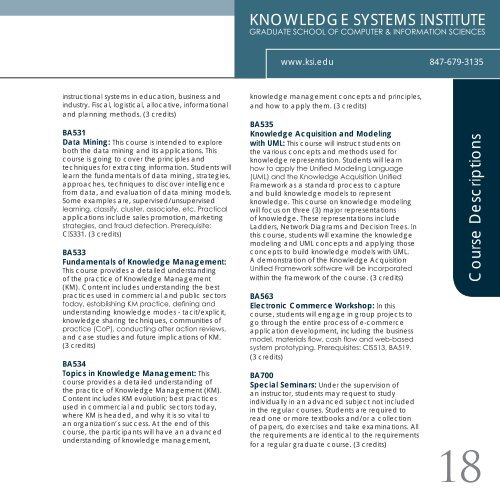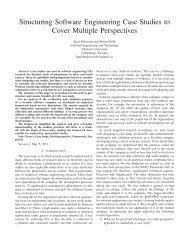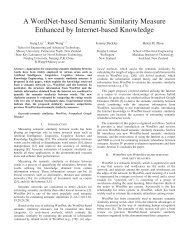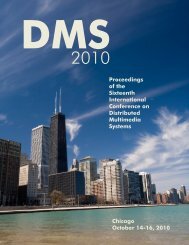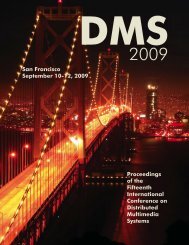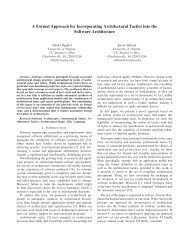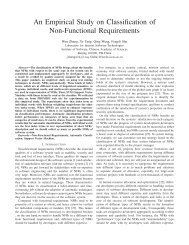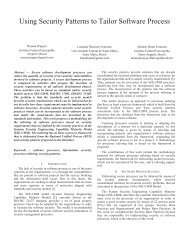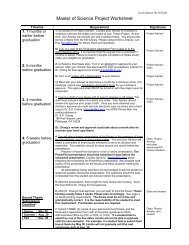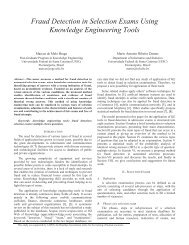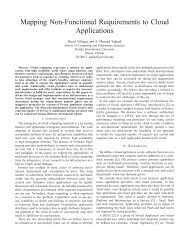Course Catalog - Knowledge Systems Institute
Course Catalog - Knowledge Systems Institute
Course Catalog - Knowledge Systems Institute
Create successful ePaper yourself
Turn your PDF publications into a flip-book with our unique Google optimized e-Paper software.
KNOWLEDGE SYSTEMS INSTITUTE<br />
GRADUATE SCHOOL OF COMPUTER & INFORMATION SCIENCES<br />
www.ksi.edu<br />
847-679-3135<br />
instructional systems in education, business and<br />
industry. Fiscal, logistical, allocative, informational<br />
and planning methods. (3 credits)<br />
BA531<br />
Data Mining: This course is intended to explore<br />
both the data mining and its applications. This<br />
course is going to cover the principles and<br />
techniques for extracting information. Students will<br />
learn the fundamentals of data mining, strategies,<br />
approaches, techniques to discover intelligence<br />
from data, and evaluation of data mining models.<br />
Some examples are, supervised/unsupervised<br />
learning, classify, cluster, associate, etc. Practical<br />
applications include sales promotion, marketing<br />
strategies, and fraud detection. Prerequisite:<br />
CIS331. (3 credits)<br />
BA533<br />
Fundamentals of <strong>Knowledge</strong> Management:<br />
This course provides a detailed understanding<br />
of the practice of <strong>Knowledge</strong> Management<br />
(KM). Content includes understanding the best<br />
practices used in commercial and public sectors<br />
today, establishing KM practice, defining and<br />
understanding knowledge modes - tacit/explicit,<br />
knowledge sharing techniques, communities of<br />
practice (CoP), conducting after action reviews,<br />
and case studies and future implications of KM.<br />
(3 credits)<br />
BA534<br />
Topics in <strong>Knowledge</strong> Management: This<br />
course provides a detailed understanding of<br />
the practice of <strong>Knowledge</strong> Management (KM).<br />
Content includes KM evolution; best practices<br />
used in commercial and public sectors today,<br />
where KM is headed, and why it is so vital to<br />
an organization’s success. At the end of this<br />
course, the participants will have an advanced<br />
understanding of knowledge management,<br />
knowledge management concepts and principles,<br />
and how to apply them. (3 credits)<br />
BA535<br />
<strong>Knowledge</strong> Acquisition and Modeling<br />
with UML: This course will instruct students on<br />
the various concepts and methods used for<br />
knowledge representation. Students will learn<br />
how to apply the Unified Modeling Language<br />
(UML) and the <strong>Knowledge</strong> Acquisition Unified<br />
Framework as a standard process to capture<br />
and build knowledge models to represent<br />
knowledge. This course on knowledge modeling<br />
will focus on three (3) major representations<br />
of knowledge. These representations include<br />
Ladders, Network Diagrams and Decision Trees. In<br />
this course, students will examine the knowledge<br />
modeling and UML concepts and applying those<br />
concepts to build knowledge models with UML.<br />
A demonstration of the <strong>Knowledge</strong> Acquisition<br />
Unified Framework software will be incorporated<br />
within the framework of the course. (3 credits)<br />
BA563<br />
Electronic Commerce Workshop: In this<br />
course, students will engage in group projects to<br />
go through the entire process of e-commerce<br />
application development, including the business<br />
model, materials flow, cash flow and web-based<br />
system prototyping. Prerequisites: CIS513, BA519.<br />
(3 credits)<br />
BA700<br />
Special Seminars: Under the supervision of<br />
an instructor, students may request to study<br />
individually in an advanced subject not included<br />
in the regular courses. Students are required to<br />
read one or more textbooks and/or a collection<br />
of papers, do exercises and take examinations. All<br />
the requirements are identical to the requirements<br />
for a regular graduate course. (3 credits)<br />
<strong>Course</strong> Descriptions<br />
18


